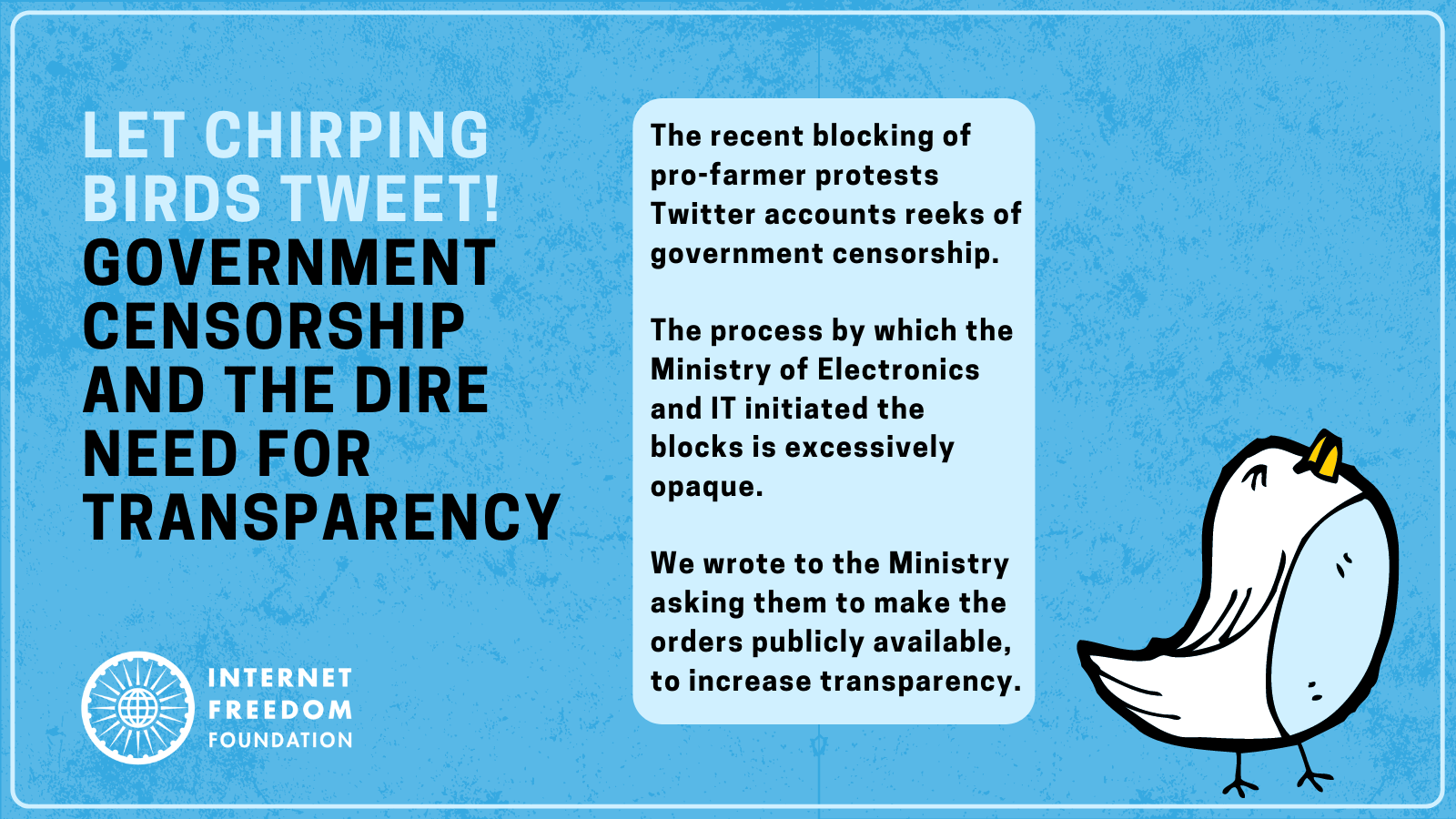On the undemocratic Twitter account blockages

Tl;dr
Recent events regarding the blocking of pro farmer protests Twitter accounts reek of government censorship. Furthermore, the process by which the Ministry of Electronics and Information Technology initiated the blocks is excessively opaque. We wrote to the Ministry asking them to make the orders publicly available so as to increase transparency.
A Timeline of the Events
Late in the afternoon on 1st February, several news reports emerged of multiple Twitter accounts being blocked in response to a legal request from the Ministry of Electronics and Information Technology. Based on the reports, it seemed as if close to 250 accounts, belonging to a diverse group of entities such as news media organisations, politicians, activists, and farmers groups, were reported to have been blocked.
The rationale purportedly as per press reports was that these accounts had been making provocative tweets about the farmer protests and had been using a specific hashtag. However, this was not substantiated, as such direction issued purportedly under Section 69A has not yet been made public.
Subsequent media reports claim that Twitter contested the order as per observable inferences. While Twitter subsequently restored the blocked accounts by the evening of 1st February after significant public outrage, concerns about secrecy, proportionality and arbitrariness have been raised. Furthermore, on February 3rd, the Ministry is reported to have sent an order to Twitter warning it about this decision.
The Ministry, pointing to Twitter’s obligations as an intermediary bound by Centre’s guidelines under section 69A of the Information Technology Act, 2000, asked Twitter to comply with the earlier order or face criminal proceedings with penal consequences of imprisonment for up to 7 years. A press note also seems to have been privately circulated amongst various media outlets that provided further details about the same and outlined both the rationale behind the initial order as well as the Centre’s stance on Twitter’s response.
On 8th February, fresh reports emerged of a new order having been sent by the Ministry on 4th February, sharing a list of 1,178 more accounts that it wanted removed.
A lack of accountability and transparency
Such actions are harmful not only for operational transparency but also for India’s democratic ethos. The accounts in question have pointed out criticisms of the government in the past, and so blocking such accounts, especially those that belong to media organisations such as Caravan, is tantamount to censorship (especially when the government has failed to substantiate the grounds on which the order for blocking was based).
The secrecy and lack of a clear process with respect to the blocking of the accounts is especially concerning if directions have indeed been made under Section 69A of the Information Technology Act, 2000. From news reports no show cause notice or opportunity to present a defence has been provided to the users of these accounts. Indeed, Twitter did not even notify most of these accounts about their access being withheld.
Additionally, the directions themselves, which would contain the reasons for why the accounts have been directed to be suspended, have not been made public. This directly impacts the users of the accounts with respect to their fundamental rights to freedom of speech and expression and access to judicial remedies. Furthermore, it is in breach of the directions of the Supreme Court in the Shreya Singhal (paras 117, 118, & 119) and Anuradha Bhasin Judgements (paras 15, 16, 17, & 18) that recognise the public’s right to receive public information and any censorship for it being as per principles of transparency and proactive disclosures.
Recommendations
In light of the above, we urge the Ministry to recall these directions for blocking of the Twitter accounts and in future commence any proceedings by providing a fair and clear opportunity to the users of accounts to participate and present their defence. Further, any eventual orders under Section 69A must be made publicly available.
Important Documents
- IFF's letter to MEITY regarding 'Secretive and disproportionate directions issued to Twitter under Section 69A of the Information Technology Act, 2000' (link)
- A previous post containing an analysis of the The Information Technology [Intermediaries Guidelines (Amendment) Rules], 2018 (link)
- Our comments and counter comments on the proposed changes to the Intermediaries Guidelines (Amendment) Rules (link)
